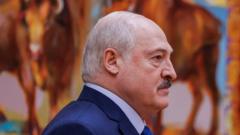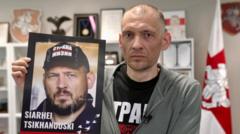With Alexander Lukashenko poised for yet another term, citizens express skepticism about legitimate change amid social repression.
Indifference and Insecurity: Belarusians Gaze Towards 2025 Election

Indifference and Insecurity: Belarusians Gaze Towards 2025 Election
As presidential elections loom, the political landscape in Belarus remains shrouded in apathy and fear.
In January 2025, Belarus faces an election that evokes little excitement. The cold winter has blanketed Minsk in grey, mirroring the political atmosphere: bleak and indifferent. Alexander Lukashenko, often referred to as "Europe's last dictator," has maintained a tight grip on power since 1994 and is expected to secure a seventh term despite apparent disinterest in the electoral process.
The lack of campaigning is conspicuous. Driving through the capital, one would find scant promotional efforts for candidates. Lukashenko himself admitted he has not followed the election campaign, instead showcasing a gift from factory workers: an axe for chopping wood, which he humorously promised to try out before the election. His supporters validate the impending election as a depiction of "Belarusian democracy," while opponents label it as a mere facade.
The specter of 2020 looms large—Lukashenko's disputed 80% electoral win led to nationwide protests, which were met with violent repression and mass detentions of dissenters. Today, his main adversaries are either incarcerated or have fled the country to escape persecution, leading the European Parliament to denounce the upcoming election as illegitimate.
Recent interviews reveal a disjointed political opposition. Among those contesting against Lukashenko are Sergei Syrankov, the Communist leader, who publicly endorses the president while running, and Oleg Gaidukevich of the Liberal-Democratic Party, who acknowledges Lukashenko's anticipated victory, declaring his own campaign as one of positioning for future contests.
While the official narrative suggests widespread support for Lukashenko, many Belarusians express a mix of resignation and apprehension about the alternatives. In towns like Oktyabrskaya, residents cite desires for stability over change, fearing a transition might lead to chaos reminiscent of Ukraine's experiences. One local welder articulates the desire for steady employment and familiar governance amidst this turbulent landscape.
Ultimately, as voters gear up for the elections, caution prevails, reflecting a collective anxiety about the unknown rather than a spirited embrace of democracy, all of which serves to bolster Lukashenko's dominance as he prepares for another term in an environment rife with skepticism.
The lack of campaigning is conspicuous. Driving through the capital, one would find scant promotional efforts for candidates. Lukashenko himself admitted he has not followed the election campaign, instead showcasing a gift from factory workers: an axe for chopping wood, which he humorously promised to try out before the election. His supporters validate the impending election as a depiction of "Belarusian democracy," while opponents label it as a mere facade.
The specter of 2020 looms large—Lukashenko's disputed 80% electoral win led to nationwide protests, which were met with violent repression and mass detentions of dissenters. Today, his main adversaries are either incarcerated or have fled the country to escape persecution, leading the European Parliament to denounce the upcoming election as illegitimate.
Recent interviews reveal a disjointed political opposition. Among those contesting against Lukashenko are Sergei Syrankov, the Communist leader, who publicly endorses the president while running, and Oleg Gaidukevich of the Liberal-Democratic Party, who acknowledges Lukashenko's anticipated victory, declaring his own campaign as one of positioning for future contests.
While the official narrative suggests widespread support for Lukashenko, many Belarusians express a mix of resignation and apprehension about the alternatives. In towns like Oktyabrskaya, residents cite desires for stability over change, fearing a transition might lead to chaos reminiscent of Ukraine's experiences. One local welder articulates the desire for steady employment and familiar governance amidst this turbulent landscape.
Ultimately, as voters gear up for the elections, caution prevails, reflecting a collective anxiety about the unknown rather than a spirited embrace of democracy, all of which serves to bolster Lukashenko's dominance as he prepares for another term in an environment rife with skepticism.




















